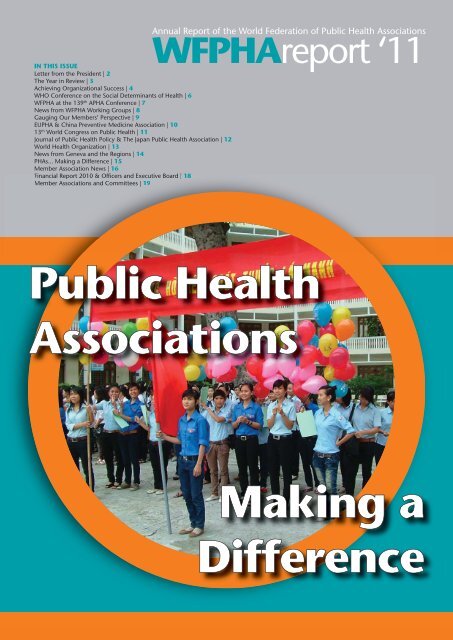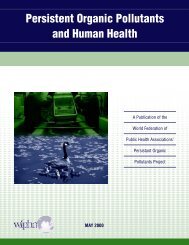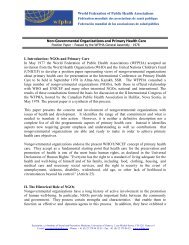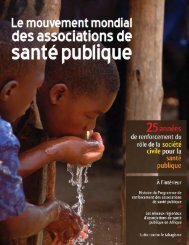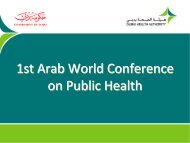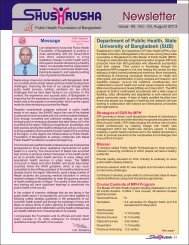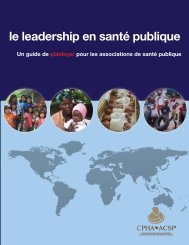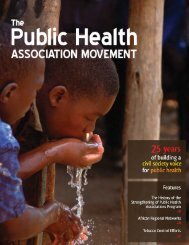WFPHA Annual Report - Delaware Health Sciences Alliance
WFPHA Annual Report - Delaware Health Sciences Alliance
WFPHA Annual Report - Delaware Health Sciences Alliance
You also want an ePaper? Increase the reach of your titles
YUMPU automatically turns print PDFs into web optimized ePapers that Google loves.
Achieving OrganizationalSuccess2007 – 2012 Strategic PlanVisionTo lead the quest for a healthy global societyMission <strong>WFPHA</strong> is an international, non-governmental, multi-professional and civil societyorganization, dedicated to promoting and protecting global public health.ValuesRight to <strong>Health</strong>: We hold that health is a fundamental human right and publicgood.Social Justice: We advocate for equity and non-discrimination and the eliminationof health disparities.Diversity and Inclusion: We promote a global public health perspective thatincludes diverse social and cultural backgrounds, ethnicity, race, gender, sexualorientation and disability.Partnership: We use partnership as a basis for mutual learning and capacitybuilding.Ethical Conduct: We believe in the ethical practice of public health for individualsand populations.Over the past year, the Federation carried out activities that moved forward the achievement of all five strategic goals:Goal One:Goal Two:To develop and promote effective global policies to improve the health of populations.• <strong>WFPHA</strong> member surveys on public health priority areas and on the role of public health associationsin achieving health equity through a social determinants of health approach were carried out.To advance public health practice, education/training and research.• Four articles on a range of priority public health issues were published in the Journal of Public <strong>Health</strong>Policy, a bi-monthly Federation e-Newsletter was published, and the planning of the 13 th WorldCongress gained momentum. The KM4PH Elluminate-based network was used on a regular basis.Goal Three: To expand and strengthen internal and external partnerships.• The formal collaborative relationship agreement between WHO and the <strong>WFPHA</strong> was reinforced andthe concept for developing a <strong>WFPHA</strong> position on the status of achievement of the MDGs and a callfor their renewal and recommitment of leadership and resources for their achievement was approved;A <strong>WFPHA</strong> statement on NCDs was released at the WHO January 2011 Executive Board meeting.Goal Four:Goal Five:To achieve and maintain an effective, efficient and sustainable organization.• The Geneva office functioned effectively, the number of <strong>WFPHA</strong> members increased and a survey wasconducted on public health priorities for our members.To support member associations in improving their infrastructure andorganizational capacity.• The Canadian Public <strong>Health</strong> Association continued to implement the Strengthening of Public <strong>Health</strong>Associations (SOPHA) Program. <strong>WFPHA</strong> and APHA partnered with CPHA to conduct the SOPHAProgram’s final evaluation in late November 2011. The Burkina Faso Public <strong>Health</strong> Association becamethe manager of a new project for the creation and implementation of a computer-based regionalnetwork for francophone public health communities on best practices related to mother/child healthsupported by the Paris-based Office international de la Francophone. The <strong>WFPHA</strong> also lent its supportto the establishment in August 2011 of the African Federation of Public <strong>Health</strong> Associations andremained active within the Asia-Pacific Regional Cooperation on Public <strong>Health</strong> network.4 | <strong>WFPHA</strong>report ‘10 wfpha.org
Goals & StrategiesGoal One:To develop and promote effective global policies to improve the health of populations.Strategies:• Develop a process for creating and prioritizing global health policy for action by <strong>WFPHA</strong> and other stakeholders.• Make efficient use of all methods to disseminate and advocate the policies of the <strong>WFPHA</strong>.Goal Two:To advance public health practice, education/training and research.Strategies:• Encourage all member associations to use the Knowledge Management for Public <strong>Health</strong> (KM4PH) networkto exchange public health practices, knowledge and research.• Develop a plan to provide on-going education and training at regional and global levels.• Identify and implement approaches to enhance the use of the Journal of Public <strong>Health</strong> Policy.• Continue organizing the World Congress on Public <strong>Health</strong>.Goal Three: To expand and strengthen internal and external partnerships.Strategies:• Establish formalized collaborations with international governmental and non-governmental organizations,alliances and United Nations bodies.• Develop a plan to increase member involvement in global public health initiatives and networking.Goal Four:Goal Five:To achieve and maintain an effective, efficient and sustainable organization.Strategies:• Assess the current structures, policies and functions of the <strong>WFPHA</strong> and make changes as dictated by the<strong>WFPHA</strong> strategic plan.• Develop a business plan, including funding, for short-term and long-term sustainability of <strong>WFPHA</strong>.• Review the current membership criteria and make recommendations.To support member associations in improving their infrastructure andorganizational capacity.Strategies:• Develop a plan to assist members in achieving fiscal and organizational sustainability.• Obtain funding to assist member associations in strengthening their operational capacity.• Develop mechanisms to guide member associations in strengthening their policy making and advocacycapacity.wfpha.org <strong>WFPHA</strong>report ‘10 | 5
Gauging Our Members’ PerspectiveThe <strong>WFPHA</strong> cannot function without its member associations. It relies on them to guide it along its mission path to promote andprotect global public health. From time to time, the Federation requests its member associations to advise it on how it has beendoing and where it should focus its efforts.The Federation conducted two surveys in 2011for this purpose. The first, a survey of whatmember associations perceive as the prioritypublic health issues for them and for the<strong>WFPHA</strong> and member associations and theirexpectations about the role of the <strong>WFPHA</strong>, wasconducted through an e-survey in June 2011.The survey investigated the issues deemed ofhighest importance among public healthassociations worldwide and by WHO region.<strong>WFPHA</strong> members identified several priorityareas for action by national PHAs. The “topfive” included health policy development (65%of respondents), public health education(58%), tobacco control and health serviceevaluation (tied at 52%) and health systemreform (48%). NCD prevention, theachievement of the MDGs and global healthequity also ranked in the “top 10”. The resultsdid not vary substantively across the WHOregions, although the Africa region PHAs didrank Public <strong>Health</strong> Human Resources as themost important issue.Member associations felt that the <strong>WFPHA</strong>should give PHAs more visibility, shouldexchange information and partner withmultilateral and international organizations,and should create and facilitate the70%60%50%40%30%20%10%0%90%80%70%60%50%40%30%20%10%0%65%<strong>Health</strong> policydevelopmentTop 5 topics on the global health agendaimplantation of collaborative public health projects with <strong>WFPHA</strong> member associations. <strong>WFPHA</strong> will use the survey’s results toinform its new 5-year strategic plan and respond to its members’ expectations. The survey results were communicated to <strong>WFPHA</strong>members in the Federation’s October 2011 Newsletter. (http://tinyurl.com/7qfy5xs). Marta Lomazzi, <strong>WFPHA</strong> Program Manager,presented the survey results as a poster at the 2011 EUPHA Conference in Copenhagen.58%Public <strong>Health</strong>Educaon84% 84%Giving PHAs morevisibility52% 52%<strong>Health</strong> ServicesEvaluaon71%Tobacco useMain expectaons from the <strong>WFPHA</strong>Collaborang withlarge internaonalhealth agenciesCreang commonprojects in PH61%Aendinginternaonal PHmeengs48%<strong>Health</strong> systemsreform58%Forging partnershipswith other naonalPHAs and healthagenciesThe second survey, conducted in September 2011, canvassed <strong>WFPHA</strong> member associations about their role in promoting actionon the socio-economic determinants of health as a means to achieve health equity and to identify the opportunities, successes,failures, challenges and obstacles to take action on the SDH. The respondents felt that the two primary roles of a PHA were toadvocate for effective policy or program interventions (“agenda setting”) and to provide evidence to local and national decisionmakers.They also felt that PHAs can and should play an important role in awareness raising among the public, the media andamong politicians about health equity and practical means to address the SDH. The Federation’s members felt the <strong>WFPHA</strong> had aspecial advocacy role to play with multilateral agencies and governments, and that it should be more vocal. PHA members voicedtheir concern about the lack of political commitment and national action on the SDH, and cited the need for more means toexchange information about promising practices on the application of policies and strategies that promote health equity throughan SDH approach. There was unanimity in encouraging the <strong>WFPHA</strong> to adopt a Call to Action on <strong>Health</strong> Equity for All at the 13thWorld Congress on Public <strong>Health</strong>. The survey results were communicated during a panel presentation by the <strong>WFPHA</strong> at the WHOConference on the Social Determinants of <strong>Health</strong> in October 2011. The survey results can be accessed at:http://tinyurl.com/7grv49k.wfpha.org <strong>WFPHA</strong>report ’11 | 9
2011 has been a successful, packed year of further developing activities for EUPHA’s three strategic objectives: capacity building,knowledge building and policy building. It is not possible to list all achievements; here are some highlights.The first achievement was the Association’s active involvement in the European ministerial meeting on health, held in Poznan,Poland on 7-8 November. EUPHA organized a workshop on <strong>Health</strong> in all Policies in association with the Polish presidency of theEU, the Polish Association of Public <strong>Health</strong> and the European Observatory on <strong>Health</strong> Systems and <strong>Health</strong> Policies. Backgroundinformation included a draft policy brief on <strong>Health</strong> impact assessment from the European Observatory and EUPHA as well as aEUPHActs on health impact assessment. Stan Tarkowski, past president of EUPHA, took the lead in organizing this workshop. Thismarked the first time that EUPHA was proactive in policy building. The positive experience in Poznan will be continued in thecoming years.The second achievement was the production of two new instruments (EUPHActs on environment and health and health impactassessment) for dissemination, capacity and knowledge building and support for our members. Both were well received by thepublic health community. Several requests to translate the EUPHActs into other languages have been received. We also producedtwo EUPHA Snapshots (suicide and suicidal behaviour; healthy aging), both based on abstracts submitted on specific healththemes at our annual scientific conference.The third achievement was the development and successful launch of EUPHApedia, a search engine for public health in Europethat includes grey literature and practice examples. Following a successful pilot year, EUPHApedia will become open access to all.EUPHA looks forward to 2012. Not only because our Association will celebrate its 20 th anniversary, but also because the positive,proactive building of capacity, knowledge and policy will continue.– Walter Ricciardi, EUPHA PresidentChina Preventive Medicine Association (CPMA)October 25, 2010 saw the launching of the <strong>WFPHA</strong>’s Western Pacific Regional Liaison Office (WPRLO). This new regional office,housed at the CPMA, serves the Western Pacific Regional Advisory Committee, the network of public health associations from thisregion. During 2011 the WPRLO developed and launched a website (http://www.cpma.org.cn/wfpha/) and collaborated withthe Indonesian Public <strong>Health</strong> Association to organize the 3 rd Western Pacific Regional Conference on Public <strong>Health</strong> and the 3 rdWPRLO working meeting (Bali, November 2011). It also took on the task in coordination with the Geneva office of sending outannual dues invoices to <strong>WFPHA</strong> members. In late 2011, with the approval of the <strong>WFPHA</strong> Executive Board, the WPRLO becamethe Asia-Pacific Regional Liaison Office (APRLO).CPMA Vice President Cai Jiming opensthe satellite symposium of the10 th International Congress on AIDSin Asia and the PacificCPMA carried out several exciting initiatives during 2011. It cooperated with the Billand Melinda Gates Foundation, the Global Fund, and the AIDS <strong>Health</strong>care Foundation(AHF) to implement a series of HIV/AIDS prevention and control programs, focusingon promotion of testing among vulnerable populations, improvement of care andsupport to people living with HIV/AIDS, and capacity building for civil societyorganizations in HIV prevention. It continued to work with InternationaleZusammenarbeit (GIZ) GmbH, conducted on-line training program on HIV/AIDS,targeting the grass-roots level practitioners in medicine and public health; and carriedout policy development workshops. In August, CPMA organized a multi-sector teamto attend the 10th International Congress on AIDS in Asia and the Pacific, andcosponsored a satellite symposium themed “Working Together” to promotecooperation among different sectors. CPMA also coordinated with the <strong>Health</strong>Unlimited (HU) on the development of an anticipated future initiative to conductcross-border activities in communicable diseases prevention and control. In DecemberCPMA was among 19 influential civil society organizations from the cultural,education, health and sports sectors to launch the China Federation of <strong>Health</strong>Promotion, which marked a new era for health promotion in China.10 | <strong>WFPHA</strong>report ’11 wfpha.org
Moving Forward to the World CongressOnly three years remain to achieve the declaration of the Millennium Development Goals. Their achievement will requireconcerted national and global strategies, efforts and resources aimed at increasing equitable and sustainable access for theworld’s population, and especially for the world’s poorest people, to essential health and social services and to the conditions thatwill improve their health.The <strong>WFPHA</strong> and its members have an important role to play in the attainment of <strong>Health</strong> for All and the MDGs. The 13 th WorldCongress on Public <strong>Health</strong>, organized in partnership with the Ethiopian Public <strong>Health</strong> Association (EPHA) will be held in AddisAbaba (Ethiopia) between April 23 and 27, 2012. It is the <strong>WFPHA</strong>’s flagship triennial global event. This event is unique as it offersthe only opportunity for the global public health community, including service providers, practitioners, trainers, educators,researchers, academicians and scientists, to come together and deliberate on important priority issues that affect the health of allpeople. The 2012 Congress is especially timely and important, given its theme: Towards Global <strong>Health</strong> Equity: Opportunities andThreats. It will serve as a platform for public health professionals to share their knowledge and experiences, and reinforce theircommitment to jointly forge ahead with national, regional and international initiatives and partners and help nations take the lastsprint towards achieving the MDGs in 2015 and sustaining them beyond.This will be the second time the Congress is held in Africa. It will also be the inaugural international venue for the AfricanFederation of Public <strong>Health</strong> Associations (AFPHA), established in August 2011 during the World <strong>Health</strong> Organization’s AFROMeeting held in Yamoussoukro (Cote d’Ivoire). The EPHA is very proud to host this important <strong>WFPHA</strong> event showcasinginnovative approaches developed by Africans and people from all over the world to respond to priority public health issues. It ismy pleasure as President of the Ethiopian Public <strong>Health</strong> Association, along with Hailegnaw Eshete, EPHA’s Executive Director, andWorkneh Kassie, 2012 Congress Executive Coordinator, and all EPHA staff and members, to invite you to attend and participatefully in this important global public health event. The EPHA is delighted to be a partner and host this important event. We lookforward to welcoming you to historic Ethiopia, to Addis Ababa and to the Congress.Tewabech Bishaw, PhDPresident, Ethiopian Public <strong>Health</strong> AssociationRepresentatives of <strong>WFPHA</strong> and public health association at the3 rd West Pacific Regional Conference on Public <strong>Health</strong> held in Bali (Indonesia) in November 2011.wfpha.org <strong>WFPHA</strong>report ’11 | 11
Journal of Public <strong>Health</strong> PolicyA continuing relationship for the <strong>WFPHA</strong>Six years ago, the Journal of Public <strong>Health</strong> Policy launched a special relationship with the World Federation ofPublic <strong>Health</strong> Associations. As we reported in last year’s <strong>WFPHA</strong> <strong>Annual</strong> <strong>Report</strong>, the experiment ofallocating 16 pages to the Federation in each volume has been and continues to be a success. TheFederation is responsible for the content, encouraging member associations and key public healthpersonalities to submit articles and editing the articles for quality control. Professor Bettina Borisch is theeditor of the Federation’s pages.During 2011, the JPHP published four Federation-generated articles. The year began with an article authored by Samia Hurst,Bettina Borisch, and Alex Mauron about the need for high quality evidence upon which to formulate and support public healthpolicies. In the JPHP’s Spring 2011 issue, the <strong>WFPHA</strong> published its Call for Abstracts for the 13 th World Congress on Public <strong>Health</strong>,which takes place in April 2012 in Addis Ababa (Ethiopia). Alex Gatherer, in the next issue, discussed ‘Evidence, values, and ‘rightversus right’ dilemmas in public health practice’. The Autumn 2011 issue included an article written by Bettina Borisch andAshley Bloomfield in which they ask whether NCDs would be taken seriously in light of the UN High Level Summit on NCDs inSeptember 2011 (the jury remains out on this topic). The year ended with the submission for publication in January 2012 of anarticle by the Canadian Public <strong>Health</strong> Association and collaborating national public health associations in Ethiopia, Uganda,Tanzania, Mozambique and Nicaragua about the hidden epidemic of unintentional injury prevention among children and youthas a global public health issue.We proposed last year to the Ethiopian Public <strong>Health</strong> Association, host of the 2012 World Congress on Public <strong>Health</strong>, a GlobalConsultation. With hundreds of public health experts expected to attend this important global public health event, we suggestedthat our Ethiopian colleagues present some of the most difficult public health challenges in their country and seek advice from thevisiting experts. The consultation would engage visitors more deeply, giving them the opportunity to learn about and fromEthiopian colleagues. The JPHP has expressed an interest in publishing the results of this consultation.We look forward to continued collaboration with the <strong>WFPHA</strong>. And don’t forget: members of national public health associationsare offered subscriptions to JPHP at a reduced price.Anthony Robbinsanthony.robbins@tufts.eduCo-EditorsJournal of Public <strong>Health</strong> PolicyPhyllis Freemanphyllis.freeman@umb.eduwww.palgrave-journals.com/jphp/jphp@umb.eduThe Japan Public <strong>Health</strong> Association:Helping a Nation RebuildOn March 11, 2011, a magnitude 9.0 earthquake and a massive tsunami devastated the northeast region of Japan. The nuclearreactors at the Fukushima Daiichi Nuclear Power Plant were destroyed and emitted high levels of radiation. Nearly 20,000persons were killed or missing, and more than 400,000 people evacuated due to the triple disasters. The government faced aserious problem of safely treating and cleaning a huge volume of radioactively contaminated soil anddebris. In Fukushima, the Thyroid Gland Survey was implemented. It will follow up allresidents aged 18 or younger (N= 360,000) for 30 years. From the experiencesgained through the disasters, Japanese people learned that Kizuna (bonds)between human beings is the essential element to support people’s lives andcreate new societies. During the October 2011 government committeemeeting for a “<strong>Health</strong>y Japan 21” movement, it was proposed that futureactivities to promote public health in the community must develop“Kizuna”. Immediately following the disaster, the JPHA supported thepublic health workers in the affected region through various meansincluding provision of necessary information. The JPHA also presentedreports on the situation and response both at the APHA conference and atthe Western Pacific Regional Conference held at Indonesia in July 2011, theJPHA Executive Board membership changed with Dr Hideo Shinozakibecoming the new President and Dr Kozo Tatara as the new Chair.For more information about JPHA, visit: http://www.jpha.or.jp/jpha/english/12 | <strong>WFPHA</strong>report wfpha.org ’11 wfpha.org <strong>WFPHA</strong>report ‘11 | 12
The <strong>WFPHA</strong> is accredited as a non-governmental organization in official relations with the World<strong>Health</strong> Organization (WHO). The objective is to broaden the promotion of WHO policies,strategies and programs derived from the decision of WHO’s governing bodies (the Executive Board,the World <strong>Health</strong> Assembly and the Regional Committees). It also facilitates collaboration by NGOs withWHO programs through jointly agreed activities. It also helps ensure harmonization of intersectoral interests among the variousbodies and players in Member State countries, as well as within regional and global settings. As of January 2011, there were 182NGOs in official relations with WHO.What does this mean in terms of “benefits” for the <strong>WFPHA</strong>? It means the Federation has the right to appoint a representative toparticipate, without right of vote, in WHO meetings or in committees and conferences convened under its authority. It alsoprovides access for <strong>WFPHA</strong> to non-confidential documentation and other information as the WHO Director-General sees fit tomake available. This relationship also provides a right to submit a memorandum to the Director-General and as well to beassigned by WHO a focal person from within the organization (a Designated Technical Officer).In turn, <strong>WFPHA</strong> is expected to establish a mutually-agreed collaborative work plan, to report on its achievement and to update itevery three years (the present collaborative work plan ends in 2012, and a new three year work plan will be developed in early2012). <strong>WFPHA</strong> is also expected to disseminate information about WHO policies and programs, collaborate as appropriate withWHO to further <strong>Health</strong>-for-All goals and as well promote collaboration between national public health associations and theirrespective governments to implement activities that improve health for all people.The 2010-2012 WHO/<strong>WFPHA</strong> collaborative workplan has three major objectives:1. Collaboration of WHO in the 13 th World Congress on Public <strong>Health</strong>WHO’s presence and support to the Congress will be considerable. The AFRO Regional Director, Dr. L. Sambo, will representWHO at the Congress and has been invited to be a plenary speaker. Several WHO staff submitted abstracts for oral andposter presentations. WHO will also support the participation of a considerable number of African public health professionalsto attend the Congress.2. Creating stronger linkages between Public <strong>Health</strong> Practice and Public <strong>Health</strong> Education<strong>WFPHA</strong>’s new working group on Public <strong>Health</strong> Education will provide guidance to the Federation as to how national publichealth associations and the <strong>WFPHA</strong> can promote better public health education and the establishment of competencies forpublic health practice, in line with WHO’s strategy.3. Knowledge management and sharing<strong>WFPHA</strong> is making use of the Elluminate-based Knowledge Management for Public <strong>Health</strong> (KM4PH) computer-based virtualteleconferencing platform, through an agreement with the Pan American <strong>Health</strong> Organization, for its Executive Board,committee and working group meetings. The KM4PH system includes over 740 members (including <strong>WFPHA</strong>) and 36knowledge communities on a variety of topics, such as strengthening of public health associations. The <strong>WFPHA</strong> Genevaoffice meets on a regular basis with the WHO DTO, to discuss issues of mutual interest and concern and to explore ways forimproving and expanding our cooperative action on priority public health issues. <strong>WFPHA</strong> is also invited to attend the JanuaryWHO Executive Board meetings, as an observer. In January 2011, it submitted a statement on NCD prevention to the WHOExecutive Board.After three years of productive collaboration through our DTO, Rebecca Bailey, a new DTO was officially appointed in December2011. We welcome Dr. Ruediger Krech, Director of the Department of Ethics, Equity, Trade and Human Rights, as the <strong>WFPHA</strong>’sliaison at WHO. Together we will prepare the new <strong>WFPHA</strong>/WHO Collaboration Plan for 2012-2014.Rebecca BaileyRuediger Krechwfpha.org <strong>WFPHA</strong>report ’11 | 13
News from Geneva and the RegionsThe <strong>WFPHA</strong> Geneva OfficeIt has been a busy year for the <strong>WFPHA</strong> secretariat office in Geneva. Updating the <strong>WFPHA</strong>membership list, managing payment of annual membership fees, organizing and managingthe electronic KM4PH-based Executive Board meetings, organization and logisticalarrangements for the 2011 annual General Assembly, production of meeting Minutes,producing the bi-monthly <strong>WFPHA</strong> e-Newsletter, managing the <strong>WFPHA</strong> website,coordinating and conducting member surveys, supporting the work of the <strong>WFPHA</strong>’scommittees and working groups and liaising with WHO and other internationalorganizations based in Geneva are some of the many activities undertaken by thesecretariat office this past year. On top of this, Prof. Bettina Borisch, who heads theGeneva secretariat office, also acts as the Editor of the Federation’s pages in theJournal of Public <strong>Health</strong> Policy. The office staff also represented the <strong>WFPHA</strong> at theconjoint European Public <strong>Health</strong> Conference, hosted by the Danish Society of Public<strong>Health</strong> (10-12 November 2011: Copenhagen), which combined the 19 th annualmeeting of the European Public <strong>Health</strong> Association (EUPHA) and the 33 rd annual meetingof the Association of Schools of Public <strong>Health</strong> in the European Region (ASPHER).The Geneva office staff expanded this year with the addition of Marta Lomazzi on a part-time basis (oneday a week). Marta joins Professor Borisch and Laetitia Bourquin, the Geneva office’s part-time Executive Manager.The Asia Pacific RegionAfter two successful conferences in Beijing (2009) and Tokyo (2010), the 3 rd Western Pacific Regional Conference on Public<strong>Health</strong> took place in Bali (Indonesia) in mid-November, in conjunction with the 1 st International Symposium on <strong>Health</strong> Researchand Development. This event was organized by the <strong>WFPHA</strong> Western Pacific Region Liaison Office together with the IndonesianPublic <strong>Health</strong> Association, the World <strong>Health</strong> Organization and the National Institute of <strong>Health</strong> Research and Development ofIndonesia. The conference theme was “<strong>Health</strong> Research and Development to Address <strong>Health</strong> Inequality”.The two events brought together over 900 public health professionals from across the Asia-Pacific region, as well as from outsidethis geographic region. Opened by the Indonesian Minister of <strong>Health</strong>, the conference included 22 invited plenary speakers,38 oral sessions and 100 posters. The range of topics covered included “<strong>Health</strong> Resources to Achieve Universal Coverage”,“Communicable & Non-communicable Diseases”, “Maternal and Child <strong>Health</strong>”, “Environmental <strong>Health</strong>”. On the conference’sfirst day, three workshops brought together more than 50 participants who learned about WHO’s <strong>Health</strong>Mapper (a surveillanceand mapping application to address critical surveillance information needs across infectious disease programs at national andglobal levels), Public <strong>Health</strong> in Emergencies and Urban <strong>Health</strong> (organized by the WHO Centre for <strong>Health</strong> Development – theKobe Centre – in Japan).The 3 rd meeting of the West Pacific Regional Coordinating Committee (WPRCC) also took place during the conference. Thebusiness meeting’s outcomes included changing the name of the <strong>WFPHA</strong> liaison office to the Asia-Pacific Regional Office (APRO)and the collaborative network conference to “Asia-Pacific Regional Conference on Public <strong>Health</strong>”. The 4 th APRPH Conference willtake place in Hanoi, Vietnam in 2013.The Africa RegionThe African Federation of Public <strong>Health</strong> Associations (AFPHA) was launched during the 61 st Session of the World <strong>Health</strong>Organization Regional Committee Meeting for Africa (29 August – September 2: Yamoussoukro, Ivory Coast). The AFPHA’slaunch and inaugural meeting was held during a RC special session.Representatives of 27 national African public health associations and the <strong>WFPHA</strong> President took part in this event, whichapproved its Constitution and By-Laws. The AFPHA’s vision is a healthy and productive population in Africa. Its mission is toengage all key stakeholders through national public health associations across the continent to influence policies, strategies andpractice to achieve health equity for all in Africa.Dr. Mathias Somé (Burkina Faso) was elected asthe AFPHA’s President, Dr. Flavia Senkubuge(South Africa) as Vice-President, and Dr.Tewabech Bishaw as the Federation’sExecutive Secretary. Other ExecutiveCommittee members were elected fromAlgeria, Cameroon, Ivory Coast, Mozambiqueand Uganda. The AFPHA’s Secretariat will bebased in Addis Ababa, housed at the EthiopianPublic <strong>Health</strong> Association.14 | <strong>WFPHA</strong>report ’11 wfpha.org
PHAs... Making a DifferencePublic health associations around the world are actively involved in actions for health and health equity. They cover a wide rangeof topics and relate to the formulation of policy statements and advocacy, building competencies, promoting best practice andtaking action at the community level on priority public health issues. Here are a few examples of what <strong>WFPHA</strong> memberassociations have been doing and achieving over the past few years.Niger: Assessing health risks associated with the constructionof mini-damsVietnam: Working with communities to mitigate health risksdue to dioxin (Agent Orange) exposureUganda: Advocating successfully for no-smoking/no drugsworkplace policiesHaiti: Conducting research on the factors responsible forimmunization abandonment and hesitancyChina: On-line training program on HIV/AIDS preventionCanada: Successfully argued before the Supreme Court ofCanada to overturn a federal government decision to closedown a supervised injection facilitywfpha.org <strong>WFPHA</strong>report ’11 | 15
Financial <strong>Report</strong> 2011At the May 2011 Executive Board and <strong>Annual</strong> General Assembly meetings, the <strong>WFPHA</strong> Finance Committee tabled a reportassessing the Federation’s financial situation. The report concluded that the Federation should develop a business plan andrevenue generation strategy to ensure its future sustainability and financial resilience. The report also recommended that theFederation undertake a review of its annual membership fee policy and protocol. This latter exercise began in late 2010. Thedrafting of a business plan/revenue generation strategy took place later in 2011.During 2011 the <strong>WFPHA</strong> was successful in maintaining its revenues. These included grants from Colgate-Palmolive and theAmerican Public <strong>Health</strong> Association. Revenue generated through membership fees also increased. Here is a summary comparison(unaudited) of 2010 and 2011 income and expenses (figures are rounded, in US dollars).2010 2011IncomeMembership Dues $9,029 $11,501Grants 125,868 97,000Interest & Other 3,932 222Expenditures 36,892 129,319Surplus/(Deficit) $101,937 ($20,597)Financial SituationOpening Balance (January 1) $50,590 $101,937Closing Balance (December 31) $152,527 $81,340The <strong>WFPHA</strong>’s financial report and balance sheets will be verified by the auditor (Jacqueline de la Cruz of Switzerland).OfficersPresident (2010-2012) Vice-President/President-Elect (2010-2012)Prof. Ulrich Laaser, MDJames ChauvinGerman Association for <strong>Health</strong> <strong>Sciences</strong> and Public <strong>Health</strong> (DVGPH) Canadian Public <strong>Health</strong> Association (CPHA)Immediate Past-President (2010-2012) Treasurer (2011-2013)Dr. Paulo Marchiori BussMarkus KaufmannBrazilian Association for Collective <strong>Health</strong> (ABRASCO)Swiss Society for Public <strong>Health</strong>Executive BoardAFRODr. Tewabech Bishaw, Ethiopian Public <strong>Health</strong> Association (2009 – 2012)Prof. Laetitia Rispel, Public <strong>Health</strong> Association of South Africa (2011 – 2014)AMRODr. Georges Benjamin, American Public <strong>Health</strong> Association (2009 – 2012)Dr. Luis Augusto Facchini, Brazilian Association for Collective <strong>Health</strong> (2011 – 2014)EMRO(vacant)EURODr. Hikmet Pekcan, Turkish Public <strong>Health</strong> Association (2009 – 2012)Dr. Gabriel Scally, UK Public <strong>Health</strong> Association (2009 – 2012)SEARODr. Madhumita Dobe, Indian Public <strong>Health</strong> Association (2010 – 2013)WPRODr. Cai Jiming, China Preventive Medicine Association (2010 – 2013)Dr. Toshitaka Nakahara, Japan Public <strong>Health</strong> Association (2009 – 2012)WHO Liaison to <strong>WFPHA</strong>Rebecca Bailey, Department of Human Resources for <strong>Health</strong> (to November 2011)Dr. Ruediger Krech, Department of Ethics, Equity, Trade and Human Rights (as of December 2011)18 | <strong>WFPHA</strong>report ’11 ‘11 wfpha.org
Member Associations(by alphabetical order)• Afghanistan National Public health Association• All-Ukrainian Public <strong>Health</strong> Association• American Public <strong>Health</strong> Association• Armenian Public <strong>Health</strong> Association• Associação Brasileira de Pós-graduação em Saúde Coletiva• Associação Moçambicana de Saúde Pública• Association burkinabé de santé publique (Burkina Faso)• Association camerounaise de santé publique• Association de Santé Publique d’Haïti• Association Nigérienne pour la promotion de la santépublique• Association Sénégalaise des Professionnels de Santé Publique• Azerbaijan National <strong>Health</strong> Association• Bangladesh Public <strong>Health</strong> Association• Bolivian Public <strong>Health</strong> Association• Canadian Public <strong>Health</strong> Association• Chilean Society for Public <strong>Health</strong>• China Preventive Medicine Association• Colombia Academy of Public <strong>Health</strong> and Social Security• Costa Rica Public <strong>Health</strong> Association• Cuban Public <strong>Health</strong> Association• Ethiopian Public <strong>Health</strong> Association• Finnish Society for Social Medicine• German Association for <strong>Health</strong> <strong>Sciences</strong> and Public <strong>Health</strong>(DVGPH)• <strong>Health</strong> Promotion Union of Estonia• Hungarian Society of Hygiene• Indian Public <strong>Health</strong> Association• Indonesian Public <strong>Health</strong> Association• Iranian Public <strong>Health</strong> Association• Israeli Public <strong>Health</strong> Association• Italian Society of Hygiene, Preventive Medicine and Public<strong>Health</strong>• Japan Public <strong>Health</strong> Association• Jordan Public <strong>Health</strong> Association• Kazakhstan Association of Public <strong>Health</strong> Specialists• Kenya Community <strong>Health</strong> Association• Korean Public <strong>Health</strong> Association• Macedonian Medical Society/Association for Social Medicine• Mexican Society of Public <strong>Health</strong>• Mongolian Public <strong>Health</strong> Professionals’ Association• Netherlands Public <strong>Health</strong> Federation• Nicaragua Public <strong>Health</strong> Association• Nigerian Public <strong>Health</strong> Association• Norwegian Public <strong>Health</strong> Association• Partnership for Public <strong>Health</strong> – FBiH (Bosnia & Herzegovina)• Polish Society of Hygiene• Portuguese Association for the Promotion of Public <strong>Health</strong>• Public <strong>Health</strong> Association of Australia• Public <strong>Health</strong> Association of Georgia• Public <strong>Health</strong> Association of New Zealand• Public <strong>Health</strong> Association of Republika Srpska (Bosnia &Herzegovina)• Public <strong>Health</strong> Association of Serbia• Public <strong>Health</strong> Association of South Africa• Public <strong>Health</strong> Schweiz (Switzerland)• Romanian Public <strong>Health</strong> and <strong>Health</strong> ManagementAssociation• Royal Society for the Promotion of <strong>Health</strong> (UK)• Russian Public <strong>Health</strong> Association• Spanish Society for Public <strong>Health</strong> and <strong>Health</strong>careAdministration• Sudanese Society for Social and Preventive Medicine• Tanzanian Public <strong>Health</strong> Association• Thailand National <strong>Health</strong> Association• Turkish Public <strong>Health</strong> Association• Uganda National Association of Community andOccupational <strong>Health</strong>• United Kingdom Faculty of Public <strong>Health</strong> (formerly UnitedKingdom Public <strong>Health</strong> Association)• Vietnam Public <strong>Health</strong> AssociationRegional Members• Association of Schools of Public <strong>Health</strong> in the EuropeanRegion (ASPHER)• East, Central and Southern African Public <strong>Health</strong> Association(ECSAPHA)• European Public <strong>Health</strong> Association (EUPHA)Sustaining Members• The World Association of Chinese Public <strong>Health</strong> Professionals• Graduate Institute of International and Development Studiesof Geneva• Dubai <strong>Health</strong> Authority• Taiwan Public <strong>Health</strong> Association• Gambia Association of Public <strong>Health</strong> Officers• German Association for Public <strong>Health</strong> (DGPH)• German Coordinating Agency for Public <strong>Health</strong> (AHPGS)• Association of Public <strong>Health</strong> Physicians of Nigeria• Njala University Public <strong>Health</strong> Association (Sierra Leone)Advisory BoardTheodor Abelin (Switzerland)Georges Benjamin (USA)Paulo Buss (Brazil)Margaret Hilson (Canada)Wen Kilama (Tanzania)Deborah Klein Walker (USA)Pekka Puska (Finland)CommitteesBy-laws Committee:Theodor Abelin, Dineke Zegers, Margaret HilsonFinance Committee:James Chauvin, Gabriel Scally, Georges Benjamin,Markus Kaufmann, Bettina BorischMembership/Awards Committee:Alvaro Matida, Theodor Abelin, Andrei DeminNominations Committee:Mengistu Asnake, Theodor Abelin, Cai Jiming,Georges BenjaminPolicy Committee:Bettina Borisch, Gabriel Scally, Madhumita Dobe, Paulo Buss,Peter Orris, Ulrich Laaser, Deborah Klein Walker, Ligia BahiaWorking GroupsEnvironmental <strong>Health</strong>: Peter Orris (USA) – ChairGlobal <strong>Health</strong> Equity: Deborah Klein Walker (USA) and BettinaBorisch (Switzerland) – Co-ChairsPublic <strong>Health</strong> Education: Ehud Miron (Israel) – ChairTobacco Control: Mike Daube (Australia) – ChairPPH (FBiH) representative talks to mediaabout harms associated with tobacco usewfpha.org <strong>WFPHA</strong>report ’11 ‘11 | 19
<strong>WFPHA</strong>report ‘11is the <strong>Annual</strong> <strong>Report</strong> of the World Federation ofPublic <strong>Health</strong> Associations<strong>WFPHA</strong> is an international, nongovernmental organizationcomposed of multidisciplinary national public healthassociations. It is the only worldwide professional societyrepresenting and serving the broad field of public health.<strong>WFPHA</strong>’s mission is to promote and protect global publichealth. It does this throughout the world by supporting theestablishment and organizational development of publichealth associations and societies of public health, throughfacilitating and supporting the exchange of information,knowledge and the transfer of skills and resources, andthrough promoting and undertaking advocacy for publicpolicies, programs and practices that will result in a healthyand productive world.The views expressed in this document do not necessarilyreflect those of all <strong>WFPHA</strong> member associations. Materialsmay be reproduced with due acknowledgement for noncommercialpurposes. Comments and suggestions about the<strong>WFPHA</strong>’s annual report can be communicated to LaetitiaBourquin, the <strong>WFPHA</strong> Executive Manager,at:laetitia.bourquin@unige.chContributorsSejdefa Basic-Catic (BiH)Tewabech Bishaw (Ethiopia)Bettina Borisch (Switzerland)Laetitia Bourquin (<strong>WFPHA</strong> Secretariat)Luis Caceres (Canada)James Chauvin (Canada)Angela Fermín (Spain)Mika Gissler (Finland)Vina HuLamm (USA)Cai Jiming (China)Ulrich Laaser (Germany)Alejandra Livschitz (Argentina)Marta Lomazzi (<strong>WFPHA</strong> Secretariat)Nick Lorenz (Switzerland)Markus Kaufmann (Switzerland)Gay Keating (New Zealand)Dominique Kondji Kondji (Cameroun)Michael Moore (Australia)Nguyen Ngoc Bich (Vietnam)Alcides Ochoa Alonso (Cuba)Peter Orris (USA)Walter Ricciardi (EUPHA)Mathias Somé (Burkina Faso)Mustakim Sprinter (Indonesia)Stela Stojisavljevic (BiH)Accreditation Agency for Study Programs in <strong>Health</strong> and Social <strong>Sciences</strong> (AHPGS)Geneva Office (postal address)World Federation of Public <strong>Health</strong> Associationsc/o Institute for Social and Preventive MedicineCMU/University of Geneva1, rue Michel ServetCH-1211 Geneva 4 Tel: +41 22 379 04 53Switzerland Fax: +41 22 379 04 52Physical address:Villa Friedheim17 chemin de la Tour de ChampelGeneva, SwitzerlandThe World Federation of Public <strong>Health</strong> Associationswould like to extend a heartfelt thank you to itssponsors for their funding, in-kind contributions andsupport over the past year:• American Public <strong>Health</strong> Association• Canadian Public <strong>Health</strong> Association• Ethiopian Public <strong>Health</strong> Association• Colgate-Palmolive• Graduate Institute of Geneva• Swiss Society of Public <strong>Health</strong>• University of Genevawww.wfpha.org


